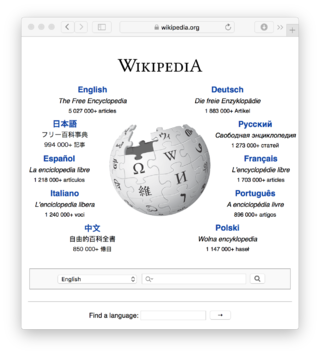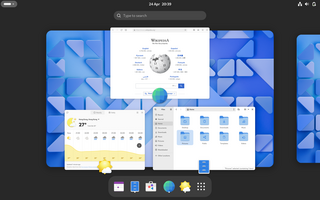
Wiki software is collaborative software that runs a wiki, which allows the users to create and collaboratively edit pages or entries via a web browser. A wiki system is usually a web application that runs on one or more web servers. The content, including previous revisions, is usually stored in either a file system or a database. Wikis are a type of web content management system, and the most commonly supported off-the-shelf software that web hosting facilities offer.
Gecko is a browser engine developed by Mozilla. It is used in the Firefox browser, the Thunderbird email client, and many other projects.

MediaWiki is free and open-source wiki software originally developed by Magnus Manske for use on Wikipedia on January 25, 2002, and further improved by Lee Daniel Crocker, after which it has been coordinated by the Wikimedia Foundation. It powers several wiki hosting websites across the Internet, as well as most websites hosted by the Foundation including Wikipedia, Wiktionary, Wikimedia Commons, Wikiquote, Meta-Wiki and Wikidata, which define a large part of the set requirements for the software. MediaWiki is written in the PHP programming language and stores all text content into a database. The software is optimized to efficiently handle large projects, which can have terabytes of content and hundreds of thousands of views per second. Because Wikipedia is one of the world's largest and most visited websites, achieving scalability through multiple layers of caching and database replication has been a major concern for developers. Another major aspect of MediaWiki is its internationalization; its interface is available in more than 400 languages. The software has more than 1,000 configuration settings and more than 1,800 extensions available for enabling various features to be added or changed. Besides its usage on Wikimedia sites, MediaWiki has been used as a knowledge management and content management system on websites such as Fandom, wikiHow and major internal installations like Intellipedia and Diplopedia.

Load testing is the process of putting demand on a structure or system and measuring its response.
Business rules are abstractions of the policies and practices of a business organization. In computer software development, the business rules approach is a development methodology where rules are in a form that is used by, but does not have to be embedded in, business process management systems.
An autolink is a hyperlink added automatically to a hypermedia document, after it has been authored or published. Automatic hyperlinking describes the process or the software feature that produces autolinks. Segments of the hypermedia are identified through a process of pattern matching. For example, in hypertext, the software could recognise textual patterns for street addresses, phone numbers, ISBNs, or URLs.
Microformats (μF) are a set of defined HTML classes created to serve as consistent and descriptive metadata about an element, designating it as representing a certain type of data. They allow software to process the information reliably by having set classes refer to a specific type of data rather than being arbitrary. Microformats emerged around 2005 and were predominantly designed for use by search engines, web syndication and aggregators such as RSS.
The Apple Developer Tools are a suite of software tools from Apple to aid in making software dynamic titles for the macOS and iOS platforms. The developer tools were formerly included on macOS install media, but are now exclusively distributed over the Internet. As of macOS 10.12, Xcode is available as a free download from the Mac App Store.
In computer log management and intelligence, log analysis is an art and science seeking to make sense of computer-generated records. The process of creating such records is called data logging.

GNOME Panel is a highly configurable taskbar for GNOME. It formed a core part of the desktop in GNOME 1 and GNOME 2. It has been replaced in GNOME 3 by default with GNOME Shell, which only works with the Mutter window manager.

Empathy was an instant messaging (IM) and voice over IP (VoIP) client which supported text, voice, video, file transfers, and inter-application communication over various IM communication protocols.

Cheese is the former default webcam application for the GNOME desktop, i.e. an application to handle UVC streams over Video4Linux. It was developed as a Google Summer of Code 2007 project by Daniel G. Siegel. It uses GStreamer to apply effects to photos and videos. It can export to Flickr and is integrated into GNOME.

The history of wikis began in 1994, when Ward Cunningham gave the name "WikiWikiWeb" to the knowledge base, which ran on his company's website at c2.com, and the wiki software that powered it. The wiki went public in March 1995, the date used in anniversary celebrations of the wiki's origins. c2.com is thus the first true wiki, or a website with pages and links that can be easily edited via the browser, with a reliable version history for each page. He chose "WikiWikiWeb" as the name based on his memories of the "Wiki Wiki Shuttle" at Honolulu International Airport, and because "wiki" is the Hawaiian word for "quick".
GNOME Activity Journal is a semantic desktop browser-like application for the GNOME desktop environment. Instead of providing direct access to the hierarchical file system like most file managers, GNOME Activity Journal uses the Zeitgeist framework to classify files according to metadata. This includes time and date of previous accesses, location of use, file type, tagging and more. In addition to local files, GNOME Activity Journal also organizes web browsing history, email and other data sources.

GNOME, originally an acronym for GNU Network Object Model Environment, is a free and open-source desktop environment for Linux and other Unix-like operating systems.
In computing, a firewall is a network security system that monitors and controls incoming and outgoing network traffic based on predetermined security rules. A firewall typically establishes a barrier between a trusted network and an untrusted network, such as the Internet.
In information technology a reasoning system is a software system that generates conclusions from available knowledge using logical techniques such as deduction and induction. Reasoning systems play an important role in the implementation of artificial intelligence and knowledge-based systems.
In digital communications networks, packet processing refers to the wide variety of algorithms that are applied to a packet of data or information as it moves through the various network elements of a communications network. With the increased performance of network interfaces, there is a corresponding need for faster packet processing.

Disk Usage Analyzer is a graphical disk usage analyzer for GNOME. It was part of GNOME Core Applications, but was split off for GNOME 3.4. It was originally named Baobab after the Adansonia tree. The software gives the user a menu-driven, graphical representation of what is on a disk drive. The interface allows for selection of specific parts of filesystem being scanned so a single folder, the entire filesystem, and even remote folders and filesystems can be scanned. The graphical representation can be switched between a ring chart and a treemap chart so the presentation can be tailored to the specific content being scanned.
The GNOME Core Applications are a software suite of approximately 30 application software that are packaged as part of the standard free and open-source GNOME desktop environment. GNOME Core Applications have the look and feel of the GNOME desktop, and often utilize the Adwaita design language. Some applications have been written from scratch and others are ports.







